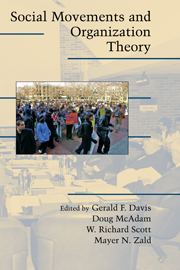Book contents
- Frontmatter
- Contents
- Contributors
- Preface
- I Creating a Common Framework
- II Political and Mobilization Context
- 3 INSTITUTIONAL VARIATION IN THE EVOLUTION OF SOCIAL MOVEMENTS: COMPETING LOGICS AND THE SPREAD OF RECYCLING ADVOCACY GROUPS
- 4 ELITE MOBILIZATIONS FOR ANTITAKEOVER LEGISLATION, 1982–1990
- 5 INSTITUTIONALIZATION AS A CONTESTED, MULTILEVEL PROCESS: THE CASE OF RATE REGULATION IN AMERICAN FIRE INSURANCE
- 6 FROM STRUGGLE TO SETTLEMENT: THE CRYSTALLIZATION OF A FIELD OF LESBIAN/GAY ORGANIZATIONS IN SAN FRANCISCO, 1969–1973
- III Social Movement Organizations: Form and Structure
- IV Movements Penetrating Organizations
- V Conclusion
- References
- Author Index
- Subject Index
5 - INSTITUTIONALIZATION AS A CONTESTED, MULTILEVEL PROCESS: THE CASE OF RATE REGULATION IN AMERICAN FIRE INSURANCE
Published online by Cambridge University Press: 05 September 2012
- Frontmatter
- Contents
- Contributors
- Preface
- I Creating a Common Framework
- II Political and Mobilization Context
- 3 INSTITUTIONAL VARIATION IN THE EVOLUTION OF SOCIAL MOVEMENTS: COMPETING LOGICS AND THE SPREAD OF RECYCLING ADVOCACY GROUPS
- 4 ELITE MOBILIZATIONS FOR ANTITAKEOVER LEGISLATION, 1982–1990
- 5 INSTITUTIONALIZATION AS A CONTESTED, MULTILEVEL PROCESS: THE CASE OF RATE REGULATION IN AMERICAN FIRE INSURANCE
- 6 FROM STRUGGLE TO SETTLEMENT: THE CRYSTALLIZATION OF A FIELD OF LESBIAN/GAY ORGANIZATIONS IN SAN FRANCISCO, 1969–1973
- III Social Movement Organizations: Form and Structure
- IV Movements Penetrating Organizations
- V Conclusion
- References
- Author Index
- Subject Index
Summary
Institutionalization – the activities and mechanisms by which structures, models, rules, and problem-solving routines become established as a taken-for-granted part of everyday social reality – represents a core sociological process and a central preoccupation for social scientists. Since Selznick's (1957) and Berger and Luckmann's (1967) classic works, understanding institutionalization has itself been understood as a critical agenda for sociologists and social constructionists. Over the last two decades or so, this agenda has been fruitfully pursued by organizational scholars and neoinstitutionalists, who have produced a variety of concepts and images of institutionalization. (For early statements and overviews, see Clemens and Cook 1999; DiMaggio 1988; Jepperson and Meyer 1991; Meyer and Rowan 1977; Schneiberg and Clemens 2003; Scott et al. 2000; Scott 1987, 1994; Zucker 1977; Tolbert and Zucker 1983.)
We work in this chapter to extend and revise these received images. Specifically, we use the case of rate regulation in fire insurance to revise conventional accounts and reconceptualize institutionalization as the product of constitutional struggles – conflicts evoked by social movements over the fundamental character of social, political, and industrial order. In so doing, we join recent efforts to link politics, challengers, and movements with organizational theory and neoinstitutional analysis (Clemens 1997; Davis and Thompson 1994; DiMaggio 1991; Fligstein 1996; Lounsbury, Ventresca, and Hirsch 2003; McAdam and Scott, this volume; Rao 1998; Rao et al. 2000; Schneiberg 1999, 2002; Soule 2003; Zald et al. 2002).
- Type
- Chapter
- Information
- Social Movements and Organization Theory , pp. 122 - 160Publisher: Cambridge University PressPrint publication year: 2005
- 117
- Cited by



